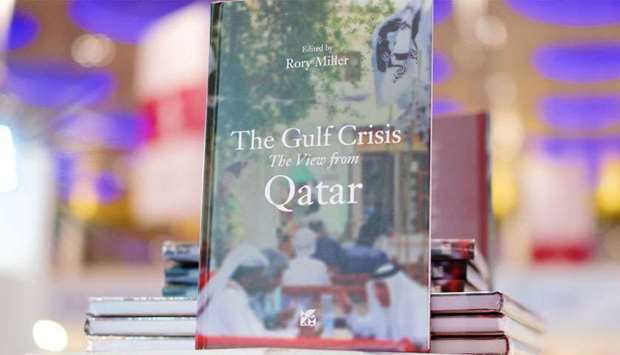Hamad Bin Khalifa University Press’ (HBKU Press) latest published title, The Gulf Crisis: The View from Qatar, officially launched at this year’s Doha Forum, which concluded on Sunday.
The book takes an in-depth look at the socio-economic factors of the blockade against Qatar through the writings of its 16 authors, led by editor Rory Miller, PhD, Professor of Government at Georgetown University in Qatar.
The book chronicles and assesses the blockade against several economic, political, social, international, and media-based factors.
The panel at the Doha Forum included presentations from several contributors of the book who highlighted their areas of expertise, including Gerd Nonneman, PhD, Professor of International Relations and Gulf Studies at Georgetown University in Qatar, who presented a foreign policy analysis perspective; Tareq al-Ansari, PhD, Assistant Professor, College of Science, Engineering and Sustainable Development at Hamad Bin Khalifa University, who spoke about food security; Jocelyn Sage Mitchell, PhD, Assistant Professor in Residence at Northwestern University in Qatar who spoke about domestic policy opportunities; and Mohamed Evren Tok, PhD, Assistant Professor and Assistant Dean for Innovation and Community Advancement, College of Islamic Studies and Public Policy in Islam at Hamad Bin Khalifa University who spoke about entrepreneurship and economic resilience.
“The main driver of this project was the realisation in the first few months of the crisis that the embargo was a major turning point in the history of the modern Gulf and that the commentary on the embargo was mainly coming from outside the region,” explains Miller.
“All the contributors are local long-standing experts in their respective fields and were working on the issues that they deal with in the volume long before the embargo began – domestic politics, religion, cultural policy, translation studies, media and journalism, International Relations theory and regional studies, energy security, food and cyber security.
“We ended up with contributors representing six QF institutions: Georgetown University in Qatar, Northwestern University in Qatar, University College London in Qatar and the Museums Authority, Texas A&M University at Qatar, and Hamad Bin Khalifa University. As such, one of the great advantages and appeals of this volume is that all the chapters do an excellent job in locating the blockade in the wider disciplinary, historical, political and social context.”
HBKU Press saw in the book its unique perspective due to the inclusion of contributions by Qatar-based experts only and in the service it provided in charting the first year of the crisis in real time in a number of areas, both in articles and pictures.
“The book is essentially a marker of history,” says Bachar Chebaro, executive director of HBKU Press. “It is an accurate and thorough representation of the Blockade from Qatar’s perspective, and it espouses HBKU Press’s commitment for providing a platform for local perspectives and narratives on international affairs.”
Senior editor Fakhri Saleh explains the value of the particular style of this book, saying, “Though it is academic, it is written in a reader-friendly manner that provides a valuable context for the blockade. It is perfect for those who want to know about the roots of the crisis as well as the more immediate aspects in terms of Qatar’s domestic and foreign policy perspective.

